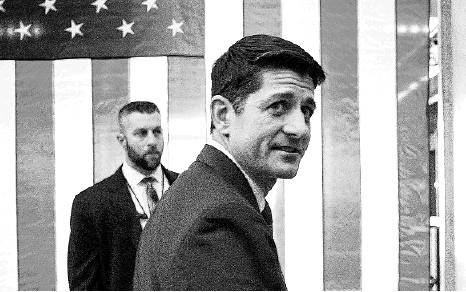THE SMART MONEY
Goodbye and good riddance: Budget hawk was a lot of hooey
The 116th Congress convened last week, and Paul Ryan has left the building.
Hey, bro — don’t let the Capitol doors hit you on the way out. Wow, what a disappointment. History will not treat him well.
Ryan entered Congress 20 years ago as a conservative fiscal policy wonk from Wisconsin, rose to prominence as a budget hawk, and became speaker of the House in 2015 on the basis of that reputation. As speaker, he threw that reputation all away.
I, too, am a fiscal conservative. By that, I mean government should not agree to do things for which we do not have a reasonable payment plan. Yes, some government debt is sustainable in the long run, but all tax and spending policies need to meet a basic fiscal test: Can we afford it in the decades to come? We do not promise rainbow cupcakes on every plate and unicorns in every backyard unless we can afford it.
For fiscal conservatives, Paul Ryan was the Chosen One.
To compare Ryan’s reputation as he accumulated power to his accomplishments once he had power — the Grand Canyon between his stated goals and what he did as speaker — is to expose him as either a colossal failure or an outright fraud. Those are really the only two options.
In 2012, Ryan told Fox News’ Sean Hannity about government debt under the Obama administration: “This is the most predictable economic crisis we have ever had in this country — it’s a debt crisis. Our debt literally gets out of control, and it ends the American dream as we know it.”
Fortunately, according to Ryan, we had him to save us.
He went on: “Let’s get back to a path of prosperity and debt reduction and paying the debt off. So what I’m basically saying is we are offering the country a choice of two futures… The more you kick the can, the worst (sic) it gets, the more imperiled our economy becomes and the more of a debt crisis we have on our hands.”
Anyway, the joke’s on us. Apparently, Ryan was only kidding about the debt problem in the years leading up to his speakership.
Yes, power is shared among many people in Washington. Enacting one’s vision is hard. But Ryan completely drove the bus for two years with the House, Senate and White House unified under the same party.
On Oct. 29, 2015, when he became speaker, through the end of 2018, the total public debt outstanding rose from $18.1 trillion to $21.8 trillion. In other words, national debt rose by more than a trillion dollars per year under Ryan’s leadership.
But that’s really not the most important place to view the huge gulf between his stated goals and accomplishments.
Annual budget deficits are an even better measure, since Congress sets budgets yearly. The budget deficit in 2015 was $439 billion but rose to $782 billion in 2018. That rise in the budget deficit is Paul Ryan’s direct legacy. In the five years before Ryan became speaker, by contrast, annual deficits fell each year. That’s also his legacy. He reversed a good trend and made it terrible.
But even these terrible numbers have to be taken in further context to show how bad he was. During recessions, we allow for government debt to expand, as a cushion on the private sector’s woes. During boom times, we look to pare back debt. The massive deficits and ballooning federal debt under Ryan’s tenure are particularly egregious because it happened during boom times, with historic low unemployment, fast growth, low inflation and rising asset prices. Even under ideal conditions, Ryan recklessly drove our fiscal bus into the ditch.
But the worst of all was the 2017 Tax Cuts and Jobs Act, in which Ryan locked in higher budget deficits for years to come, with deficit increases estimated between $1 trillion and $1.5 trillion.
Ryan’s failure and fraud are of a particularly enraging kind. By all accounts and unlike many of his colleagues in Congress, Ryan does know how budgets work. But to pass the 2017 Tax Cuts and Jobs Act, he engaged in a series of budgeting tricks — tax cuts that end abruptly after a certain number of years to “make the math work.”
Why am I not blaming President Donald Trump, under whose leadership these debt and deficit numbers also increased? Three reasons: First, Trump never claimed to be a budgets guy. Second, Congress, not the president, controls tax and spending policy. Third, Trump is doing largely what he said he’d do.
Trump, throughout his campaign, advocated protectionist industrial trade policies for the steel and auto industries, trade wars, tariffs, picking winners and losers through economic development deals, and not worrying about over-indebtedness because you can always either renege on your debts or just inflate away the problem. Each of Trump’s ideas is uniquely terrible, and taken together they are potentially catastrophic. But at least the casino owner with multiple bankruptcies under his belt is keeping his promises. In his own inimitable way, Trump is straightforward on economic policy.
But Paul Ryan — this guy has some nerve. He spent his career railing against the government’s fiscal irresponsibility. He became speaker of the House of a supposedly irresponsible tax-cuts-and-spending Congress and said, “Hold my beer.” Drunken sailors on shore leave for just 24 hours have shown more fiscal restraint than Paul Ryan with the 2017 Tax Cut and Jobs Act.
I’m shaving his head and ringing the shame bell loudly as Paul Ryan walks away from Capitol Hill. michael@michaelthesmart money.com twitter.com/michael_taylor

